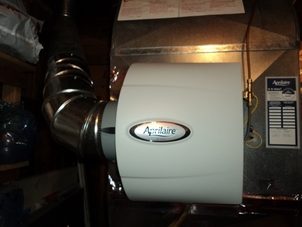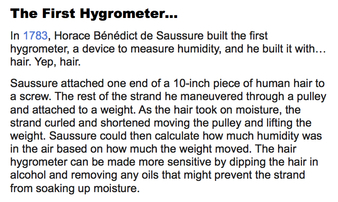
I find myself back at the old computer today writing this blog post for you, my amazing fans – all 5 of you – it’s a work in progress. Anyway, this blog post is about whole house humidifiers. Yep, I know the exciting subject of humidifiers has been keeping you up nights. Humidifiers are important for your health, the health of your home, and your comfort.
Before I get into this we need to make sure we all understand what a whole house humidifier is and when it should be used…
A whole house humidifier works by introducing moisture to the air that’s being warmed and distributed throughout your home. As air travels through the ductwork in your home, it passes through the humidifier (typically mounted on the side of your furnace) where water flows through a panel inside the unit. The air absorbs the water from the panel, thus raising the humidity levels of your entire home. The most important thing to remember though is a humidifier should only be used during the winter months when humidity is already low. Believe me in the summer, at least in Central Ohio, we don't need to add humidity to the air. It’s been miserably humid here lately…amiright?
So now that we all are on the same page here’s why you should want one…
Health
Low humidity can increase your likelihood of getting colds, flu and other upper respiratory ailments. Viruses that cause colds and flu thrive in low humidity. According to The American Society of Otolaryngology (basically ear, nose, and throat doctors and yes, I had to Google “Otolaryngology”) dry air can make people more susceptible to infection. There is also research that shows dry air can also aggravate allergy and asthma symptoms. As if all the above isn't enough, dry air in our homes can cause dry skin and nose bleeds.
Comfort
We humans sense heat and cold basically using two indicators – ambient temperature and relative humidity. A temperature with only 10% relative humidity feels like 65 degrees but if the relative humidity is increased to 40% it feels like 68 degrees. That is a 3 degree increase in comfort by adding water to the air…pretty amazing right?
Your Home and your stuff
Air that is too dry can wreak havoc on your home including causing your wood floors to contract, drywall to crack, baseboard and casing trim to contract and crack, damage electronics, and even cause paint to peel.
Wow…look at all we’ve learned about whole house humidifiers. I sure feel better now.
But wait, as Steve Jobs would always say, there’s one more thing. What’s the ideal relative humidity level for your home you ask? Well, go buy yourself a hygrometer (I had to Google that one too) and keep your home’s relative humidity level somewhere between 40% - 50%. Obviously, while you’re messing with your humidifier and your new hygrometer (ha…I got to use that word twice in a blog post and will probably never say it again) keep an eye on your windows. If there is condensation on them then turn the humidifier down a little.
Thanks for spending a few minutes with me today! Now go forth and get your humidifier ready for winter. If you need one installed, one replaced, or one repaired call your local HVAC contractor…they’ll be able to take care of whatever you need done.
I enjoy learning new things and I think the following is kinda interesting...
Before I get into this we need to make sure we all understand what a whole house humidifier is and when it should be used…
A whole house humidifier works by introducing moisture to the air that’s being warmed and distributed throughout your home. As air travels through the ductwork in your home, it passes through the humidifier (typically mounted on the side of your furnace) where water flows through a panel inside the unit. The air absorbs the water from the panel, thus raising the humidity levels of your entire home. The most important thing to remember though is a humidifier should only be used during the winter months when humidity is already low. Believe me in the summer, at least in Central Ohio, we don't need to add humidity to the air. It’s been miserably humid here lately…amiright?
So now that we all are on the same page here’s why you should want one…
Health
Low humidity can increase your likelihood of getting colds, flu and other upper respiratory ailments. Viruses that cause colds and flu thrive in low humidity. According to The American Society of Otolaryngology (basically ear, nose, and throat doctors and yes, I had to Google “Otolaryngology”) dry air can make people more susceptible to infection. There is also research that shows dry air can also aggravate allergy and asthma symptoms. As if all the above isn't enough, dry air in our homes can cause dry skin and nose bleeds.
Comfort
We humans sense heat and cold basically using two indicators – ambient temperature and relative humidity. A temperature with only 10% relative humidity feels like 65 degrees but if the relative humidity is increased to 40% it feels like 68 degrees. That is a 3 degree increase in comfort by adding water to the air…pretty amazing right?
Your Home and your stuff
Air that is too dry can wreak havoc on your home including causing your wood floors to contract, drywall to crack, baseboard and casing trim to contract and crack, damage electronics, and even cause paint to peel.
Wow…look at all we’ve learned about whole house humidifiers. I sure feel better now.
But wait, as Steve Jobs would always say, there’s one more thing. What’s the ideal relative humidity level for your home you ask? Well, go buy yourself a hygrometer (I had to Google that one too) and keep your home’s relative humidity level somewhere between 40% - 50%. Obviously, while you’re messing with your humidifier and your new hygrometer (ha…I got to use that word twice in a blog post and will probably never say it again) keep an eye on your windows. If there is condensation on them then turn the humidifier down a little.
Thanks for spending a few minutes with me today! Now go forth and get your humidifier ready for winter. If you need one installed, one replaced, or one repaired call your local HVAC contractor…they’ll be able to take care of whatever you need done.
I enjoy learning new things and I think the following is kinda interesting...
This article is for general information purposes only. Rick Kelley Builders makes no representations or warranties of any kind, express or implied, about the completeness, accuracy, reliability, suitability, or availability of any information contained herein.





 RSS Feed
RSS Feed
